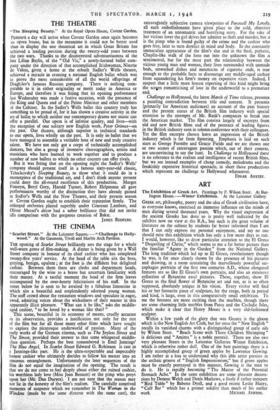THE CINEMA
"Scarlet Street." At the Leicester Square. "Challenge to Holly-
wood." At the Gaurnont, Tivoli and Marble Arch Pavilion.
THE opening of Scarlet Street brilliantly sets the stage for a whole well-worn genre of film-making. A dinner is being given by a Wall Street company in honour of its chief cashier who has completed twenty-five years' service. At the head of the table sits the boss, greying, benign, opulent ; at the foot is the diffident but delighted cashier. Between them there are clerks and department heads, encouraged by the wine to a brave but uncertain familiarity with their master. At a tactful moment the head of the firm leaves accompanied by the over-hearty felicitations of his staff. In the street below he is seen to be awaited by a fabulous limousine in which sits a beautiful and resplendently adorned young woman. The staff crowd about the restaurant windows and speculate in eager, awed, admiring voices about the wickedness of their master in this apparently illicit pleasure. "What can it be like," asks the middle- aged cashier, "to be loved by a woman like that?"
This scene, beautiful in its economy of means, cruelly accurate in its observation, provides a justification not only for the rest of the film but for all those many other films which have sought to explore the picaresque underworld of passion. Many of the early works of the German cinema, such as The Joyless Street and The Street, provided their answer to that same whispered middle- class question. Perhaps the best remembered is Emil Jannings' The Blue Angel; In Scarlet Street Edward G. Robinson is cast in a Jannings-like part. He is the ultra-respectable and impeccably honest cashier who ultimately decides to follow his master into an amorous entanglement. Unfortunately the later sequences of the film do not equal the imagination of the opening. The result is that we do not come to feel deeply about either the ruined cashier, his worthless lady love (Miss Joan Bennett) or the pimp who preys upon her (Mr. Dan Duryea). I am not sure that the reason may not lie in the honesty of the film's realism. The carefully contrived moments of suspense which we remember in The Woman in the Window (made by the same director with the same cast), the extravagantly subjective camera viewpoints of Farewell My Lovely, all such embellishments have given place to the cold, objective
treatment of an unromantic and horrifying story. For the sake of her vicious lover the girl drives her admirer to theft and murder, but It is the pimp who is found guilty of the crime and the cashier who
goes free, later to turn derelict in mind and body. In the constantly immaculate appearance of the film's slut and in the final, pathetic, Chaplin-like walk of the hero out into the unknown the film A sentimental, but for the most part the relationship between the vicious young man and woman, their lives surrounded with unmade beds, unwashed dishes and mountains of cigarette ends, is true enough to the probable facts to discourage any middle-aged cashier from squandering his firm's money on expensive vices. Indeed, I suspect that a little more honest reporting of this kind might bring the scrsen romanticising of love in the underworld to a premature end.
Challenge to Hollywood, the latest March of Time release, presents a puzzling contradiction between title and content. It presents (primarily for American audiences) an account of the past history and the present status of the British film industry with special attention to the attempts of Mr. Rank's companies to break into the American market. The film consists largely of excerpts from old and new British films and of the portraits of leading figures in the British industry seen in Solemn conference with their colleagues. Yet the film excerpts chosen leave an impression of the British industry which is far from flattering. Emphasis is laid on such stars as George Formby and Gracie Fields and we are shown one or two scenes of extravagant passion which, out of their context, are unconvincing to say the least. In Challenge to Hollywood there is no reference to the realism and intelligence of recent British films, but we see instead examples of cheap comedy, melodrama and the freakishly expensive historical spectacle, in short those productions which represent no challenge to Hollywood whatsoever.
EDGAR ANSTEY.


























 Previous page
Previous page